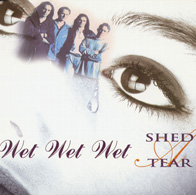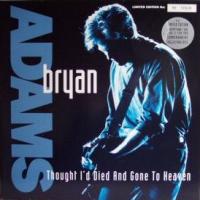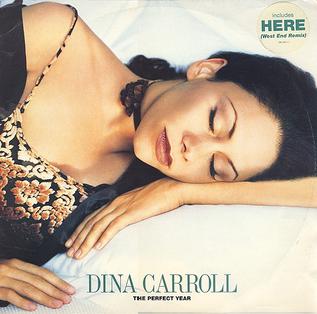
"Leaving Las Vegas" is a song co-written by David Baerwald, Bill Bottrell, Sheryl Crow, Kevin Gilbert, Brian MacLeod, and David Ricketts that appears on Crow's debut album, Tuesday Night Music Club (1993). It charted within the top 75 in the United States and the top 30 in Canada. Crow performed the song on her live album Sheryl Crow and Friends: Live from Central Park.

"I Didn't Want to Need You" is a song by American rock band Heart. It was composed by veteran songwriter Diane Warren and released as the second single from the band's 10th studio album, Brigade (1990). "I Didn't Want to Need You" peaked at number 23 on the US Billboard Hot 100 and number 14 on the Canadian RPM 100 Hit Tracks chart. It also reached the top 40 in Ireland and Sweden and number 47 on the UK Singles Chart.

"Shed a Tear" is a song by Scottish band Wet Wet Wet from their first greatest-hits album, End of Part One. It was released as a single on 25 October 1993 and reached No. 22 on the UK Singles Chart.

"Strong Enough" is a song by American singer-songwriter Sheryl Crow from her debut album, Tuesday Night Music Club (1993). The song reached number five on the US Billboard Hot 100 for three consecutive weeks, number three in Australia, and number one in Canada, becoming her second chart-topper there following "All I Wanna Do". In Australia, the song received a double-platinum certification for sales and streams exceeding 140,000 units.
"Travellers Tune" is a song by English rock band Ocean Colour Scene. American soul singer P. P. Arnold provides additional vocals on the track. The song was released on 25 August 1997 as the second single from the band's third studio album, Marchin' Already (1997), and reached number five on the UK Singles Chart.

"Wages Day" is a song by Scottish rock band Deacon Blue, released on 20 February 1989 as the second single from their second album, When the World Knows Your Name (1989). The song reached the top 20 in Ireland, Spain, and the United Kingdom. The main B-side is "Take Me to the Place", which is musically based on the hymn "Abide with Me" and the traditional melody "Eventide". Some versions of the single contain two songs: "Take the Saints Away" and a cover of Julian Cope's "Trampolene".

"She Sells Sanctuary" is a song by British rock band the Cult. It is from their second studio album, Love (1985), and was released as a single on 13 May 1985, peaking at number 15 on the UK Singles Chart in July of the same year. In July 2020, the British Phonographic Industry (BPI) awarded the song a gold certification for sales and streams of over 400,000. In January 1993, the song was re-released as "Sanctuary MCMXCIII" and experienced chart success once more, matching its original peak on the UK Singles Chart and entering the top 10 in New Zealand.

"You Keep It All In" is the second single released from English pop rock group the Beautiful South's debut album, Welcome to the Beautiful South (1989). It reached number eight on the UK Singles Chart in October 1989 and number three in Ireland. "You Keep It All In" was also a hit on American alternative rock radio, peaking at number 19 on the Billboard Modern Rock Tracks chart in early 1990.

"Slight Return" is a song by English indie rock band the Bluetones, released as the second single from their 1996 debut album, Expecting to Fly. Re-released as a solo single on 22 January 1996, it was originally issued as a double-A-side with "The Fountainhead" the previous year. "Slight Return" peaked at number two on the UK Singles Chart and is the band's highest-placing single. Bluetones frontman Mark Morriss said that the title of the song was initially a nickname, but as he was not good with naming songs, it eventually became the official title.

"Thought I'd Died and Gone to Heaven" is a song by Canadian singer and songwriter Bryan Adams from his sixth studio album, Waking up the Neighbours (1991). Penned by Robert Lange and Bryan Adams, the song became Adams' third chart-topper in his native Canada, reached No. 13 on the US Billboard Hot 100, and peaked at No. 8 in the United Kingdom.

"Constant Craving" is a song written by Canadian singer-songwriter k.d. lang and Ben Mink, performed by lang and included on her second solo album, Ingénue (1992). The song was released in the United Kingdom in April 1992 and won lang a Grammy Award in the category for Best Female Pop Vocal Performance in 1993, as well as an MTV Video Music Award for Best Female Video.

"Out of Tears" is a song by English rock band the Rolling Stones featured on their 1994 album, Voodoo Lounge. It was released as the album's third single. The song was moderately successful, reaching the top 40 in several countries, but was a successful follow-up to "Love Is Strong" in Canada, peaking at No. 3 on the RPM Top Singles chart for six consecutive weeks.

"Dreams" is the debut single of Irish rock band the Cranberries. It was originally released in September 1992 by Island Records and later appeared on the band's debut album, Everybody Else Is Doing It, So Why Can't We? (1993). The song reached the top 50 of the US Hot 100 and the top 30 of the UK Singles Chart in early 1994. A 1990 demo version was released in Ireland only in the summer of that year under their initial band name, the Cranberry Saw Us. At the end of the song, the backing vocals are sung by Mike Mahoney, ex-boyfriend of Cranberries lead singer Dolores O'Riordan.

"Run Baby Run" is a song by American singer-songwriter Sheryl Crow from her first album, Tuesday Night Music Club (1993), released by A&M Records in September 1993 as her debut single. It failed to chart in the United States but peaked at No. 86 in Canada, No. 83 in the United Kingdom, and No. 45 in the Netherlands. "Run Baby Run" was released for a third time in the UK after the success of "All I Wanna Do" and "Strong Enough", reaching a new peak of No. 24 on the UK Singles Chart in July 1995.

"All Fired Up" is a song written by Kerryn Tolhurst and first performed and released by Australian country rock group Rattling Sabres in 1987. It charted nationally, peaking at number 94 on the Australian Music Report. The following year, American singer-songwriter Pat Benatar recorded a version that became a chart hit in several countries, including Australia, where it reached number two on the ARIA Singles Chart.

"If I Ever Lose My Faith in You" is a song by English singer-songwriter Sting, released on 1 February 1993 as the lead single from his fourth studio album, Ten Summoner's Tales (1993). The song reached number 17 on the US Billboard Hot 100 and the top 40 in several European countries. In Canada, the song reached number one, spending three weeks atop the RPM 100 Hit Tracks chart and finishing 1993 as Canada's fourth-most-successful single.

"Don't Be a Stranger" is a song by British singer-songwriter Dina Carroll, released on 4 October 1993 as the sixth and final single from her debut album, So Close (1993). The record was produced by Nigel Lowis, and the strings on the track were performed by the London Session Orchestra. It was a success in the United Kingdom, reaching number three on the UK Singles Chart, and it also reached the top 30 in Ireland and Sweden. On the Eurochart Hot 100, the song peaked at number 11 in November 1993, while outside Europe, it was a number-one hit in Israel. Its accompanying music video was directed by Marcus Nispel.

"The Perfect Year" is a song performed by English singer-songwriter Dina Carroll, music by Andrew Lloyd Webber and lyrics by Don Black and Christopher Hampton. It is taken from the 1993 musical Sunset Boulevard and was released as a single on 29 November 1993 by A&M and 1st Avenue. Later, it was included on Carroll's second album, Only Human (1996). Becoming one of her most successful songs, it peaked at number five in the United Kingdom and number four in Ireland. On the Eurochart Hot 100, it reached number 17 in January 1994. In 2001, the song was included on Carroll's compilation album, The Very Best of Dina Carroll.

"Wild Women Do" is a song by American singer-songwriter Natalie Cole. The song was written by Greg Prestopino, Sam Lorber, and Matthew Wilder for the 1990 romantic comedy film Pretty Woman and was included on the film's soundtrack as the opening track. The song contains influences from pop, rock, R&B, and soul music, and its lyrics describe an independent woman who lives a wild life. In 1990, the song was also included on certain re-issues of Cole's 1989 album Good to Be Back.

"Hey Dude" is a Britpop song by English psychedelic rock band Kula Shaker. Written by frontman Crispian Mills and Kula Shaker, the song was released as the third single from their 1996 debut studio album, K, on 26 August 1996. Produced by John Leckie, "Hey Dude" became the band's joint-highest-charting song in the United Kingdom, peaking at number two in September 1996. Internationally, the single charted in Australia, Ireland, and the Netherlands, as well as on the Canadian and US rock charts. In Australia, the song was ranked at number 60 on the Triple J Hottest 100 of 1996.



















